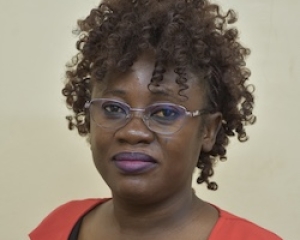Mariam Ouédraogo

Mariam Ouédraogo is the winner of the 2023 ICFJ Knight International Journalism Award.
Mariam Ouédraogo is a fearless journalist whose reports have shown the devastating impact of war on civilians in conflict-torn Burkina Faso. Her stories have shined a light on the trauma suffered by women beaten and raped by Islamist militants in the West African country and on the children born of these brutal assaults.
For her outstanding coverage, Ouédraogo is a 2023 Knight International Journalism Award winner, presented by the International Center for Journalists (ICFJ) to honor outstanding journalism that has an impact.
As a reporter for the small state-owned daily Sidwaya, Ouédraogo says she is motivated by a disdain for human misery. She has covered the rights of women and others with disabilities who beg in the nation’s capital, the struggles of displaced citizens, and the trauma of pregnant women forced to travel hundreds of miles to access an ultrasound machine.
After an article titled "Women without fixed abode: They live and procreate in the street," the government of Burkina Faso relocated hundreds of women to sites known as “Hostels of Solidarity.” The first phase of the operation took place in August 2018 and included housing for 1,379 people, according to government officials.
Ouédraogo has been celebrated for her coverage of these difficult topics, which often go unreported. Most prominently, she won the Bayeux Calvados-Normandy Award, considered the world’s most prestigious prize for war correspondents. She was the first woman journalist from Africa to do so.
She won the coveted award in 2022 for a series of reports titled “Dablo-Kaya axis: the road to hell for internally displaced women,” which described the awful journey of women raped along a road plagued by two terrorist groups.
Ouédraogo’s dogged pursuit of these heart-wrenching stories has taken a toll on her own health. She developed post-traumatic stress disorder (PTSD) while covering the series on sexual violence and was forced to take a break from reporting.
“The doctors diagnosed me with vicarious trauma, which is a transfer of the victims’ suffering. I am experiencing the same thing as them without being directly affected,” she said in an interview after winning the Bayeux Calvados award. “It’s a terrible shock. I didn’t know how to step back, maybe because I’m a woman. I put myself in their shoes and had to stop working for almost a year.”
Born in neighboring Ivory Coast into a polygamous family of modest means, Ouédraogo received an internship in Burkina Faso in 2008 at the press agency, Agence d’Information du Burkina. Determined to pursue a career in journalism, she later studied at the Institut des Sciences et Techniques de l’Information et de la Communication (ISTIC) while also working as an intern at Sidwaya. She was hired as a reporter at Sidwaya in 2013.
Ouédraogo persists in her work in a country plagued by violence and political instability, a dangerous climate for journalists. Fighting between the government and Islamist extremists has killed thousands and displaced nearly two million civilians, according to officials, and the country saw two military coups in 2022 alone, one in January and another in October.

